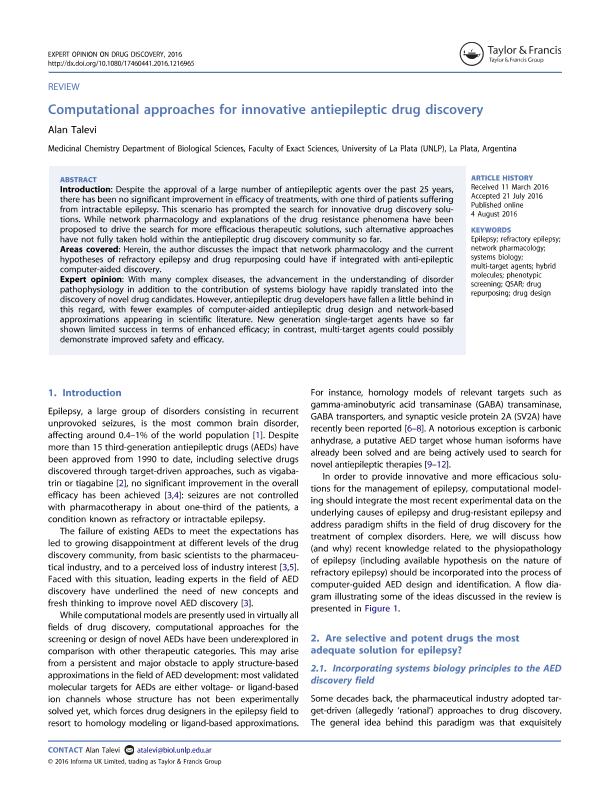Mostrar el registro sencillo del ítem
dc.contributor.author
Talevi, Alan

dc.date.available
2018-08-09T18:54:15Z
dc.date.issued
2016-10
dc.identifier.citation
Talevi, Alan; Computational approaches for innovative antiepileptic drug discovery; Taylor & Francis; Expert Opinion On Drug Discovery; 11; 10; 10-2016; 1001-1016
dc.identifier.issn
1746-0441
dc.identifier.uri
http://hdl.handle.net/11336/54819
dc.description.abstract
Introduction: Despite the approval of a large number of antiepileptic agents over the past 25 years, there has been no significant improvement in efficacy of treatments, with one third of patients suffering from intractable epilepsy. This scenario has prompted the search for innovative drug discovery solutions. While network pharmacology and explanations of the drug resistance phenomena have been proposed to drive the search for more efficacious therapeutic solutions, such alternative approaches have not fully taken hold within the antiepileptic drug discovery community so far. Areas covered: Herein, the author discusses the impact that network pharmacology and the current hypotheses of refractory epilepsy and drug repurposing could have if integrated with anti-epileptic computer-aided discovery. Expert opinion: With many complex diseases, the advancement in the understanding of disorder pathophysiology in addition to the contribution of systems biology have rapidly translated into the discovery of novel drug candidates. However, antiepileptic drug developers have fallen a little behind in this regard, with fewer examples of computer-aided antiepileptic drug design and network-based approximations appearing in scientific literature. New generation single-target agents have so far shown limited success in terms of enhanced efficacy; in contrast, multi-target agents could possibly demonstrate improved safety and efficacy.
dc.format
application/pdf
dc.language.iso
eng
dc.publisher
Taylor & Francis

dc.rights
info:eu-repo/semantics/openAccess
dc.rights.uri
https://creativecommons.org/licenses/by-nc-sa/2.5/ar/
dc.subject
Drug Design
dc.subject
Drug Repurposing
dc.subject
Epilepsy
dc.subject
Hybrid Molecules
dc.subject
Multi-Target Agents
dc.subject
Network Pharmacology
dc.subject
Phenotypic Screening
dc.subject
Qsar
dc.subject
Refractory Epilepsy
dc.subject
Systems Biology
dc.subject.classification
Otras Ciencias Químicas

dc.subject.classification
Ciencias Químicas

dc.subject.classification
CIENCIAS NATURALES Y EXACTAS

dc.title
Computational approaches for innovative antiepileptic drug discovery
dc.type
info:eu-repo/semantics/article
dc.type
info:ar-repo/semantics/artículo
dc.type
info:eu-repo/semantics/publishedVersion
dc.date.updated
2018-08-09T15:19:06Z
dc.journal.volume
11
dc.journal.number
10
dc.journal.pagination
1001-1016
dc.journal.pais
Reino Unido

dc.journal.ciudad
Londres
dc.description.fil
Fil: Talevi, Alan. Universidad Nacional de La Plata. Facultad de Ciencias Exactas. Departamento de Ciencias Biológicas. Cátedra de Química Medicinal; Argentina. Consejo Nacional de Investigaciones Científicas y Técnicas; Argentina
dc.journal.title
Expert Opinion On Drug Discovery

dc.relation.alternativeid
info:eu-repo/semantics/altIdentifier/doi/http://dx.doi.org/10.1080/17460441.2016.1216965
dc.relation.alternativeid
info:eu-repo/semantics/altIdentifier/url/https://www.tandfonline.com/doi/full/10.1080/17460441.2016.1216965
Archivos asociados
